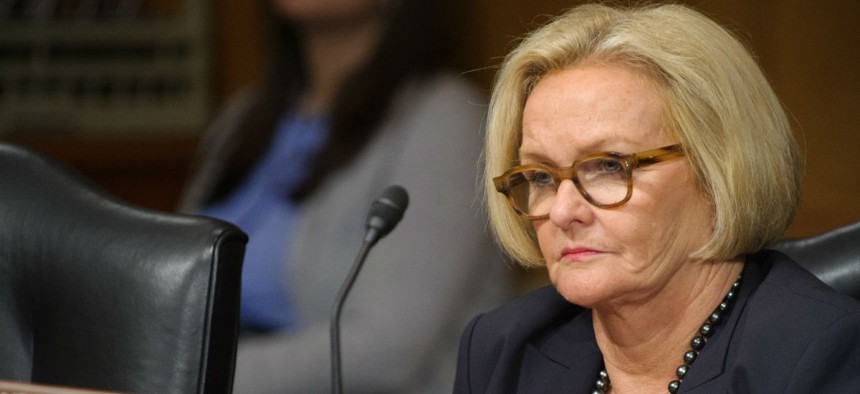
"We rely on inspectors general to be independent watchdogs, and this report raises serious concerns," said Sen. Claire McCaskill, D-Mo. Flickr user Senator Claire McCaskill
Flaws Uncovered in Vaunted Marine Corps Audit
Senators blast Pentagon watchdog for being too lax in its examination.
In another blow to the Defense Department’s quest for a clean financial statement, a congressional watchdog has uncovered flaws in a Marine Corps audit once considered a model for military services, casting blame on methods the Pentagon’s inspector general used.
A group of senators immediately pounced on the IG, whose office in March had withdrawn an audit of a fiscal 2012 Marine Corps financial statement, and whose staff appeared divided on how to proceed with the project.
In a July 30 report released Tuesday, the Government Accountability Office found that in key audit areas, the Defense inspector general in evaluating the Marines’ work “did not perform sufficient procedures, under professional standards, and consequently did not obtain sufficient, appropriate audit evidence to support the audit opinion.” The laxness affected the completeness of the transactions reported in mostly non-payroll feeder systems, the reliability of certain evidence used to support transactions and whether budgetary activity was recorded in the proper period and shipment obligations were properly recorded.
“GAO also found that the Marine Corps had made limited progress in addressing auditor recommendations since the audit of its fiscal year 2010 Statement of Budgetary Resources,” the report said.
Congress’ watchdog arm recommended that the IG’s office reconsider the findings that led to its withdrawal of the Marines’ report last spring before deciding whether to reissue the audit report. And GAO recommended that the IG develop and document a new quality assurance process for handling disagreements between its audit teams and management while stepping up monitoring of the Marine Corps financial officers’ corrective actions.
Sen. Chuck Grassley, R-Iowa, on Tuesday, took to the Senate floor to lament how “broken bookkeeping has plagued the Pentagon for years…Now, the Government Accountability Office report exposes the flimsy basis for the clean bill of health. The report is an instruction manual for how not to jump to bogus conclusions.”
Grassley added: “As hard as the inspector general’s office tried, it couldn’t produce any paper to support its conclusions. The Defense Department needs to follow every GAO recommendation to the letter. We need to get things back on track and prevent an embarrassing setback like this from ever happening again.”
Grassley praised Defense Inspector General Jon Rymer for overruling his deputy, Dan Blair, who had argued for blessing the audit despite conclusions in work papers by Grant Thornton LLP suggesting that the Marines were not meeting audit standards.
Sen. Claire McCaskill, D-Mo., said in a statement: “We rely on inspectors general to be independent watchdogs, and this report raises serious concerns …This goes beyond a simple disagreement over auditing standards between the inspector general and Government Accountability Office—it raises questions about the decision of Inspector General managers to override the concerns of their own audit team.”
The IG’s office in an exclusive statement to Government Executive said: “While we believe our original opinion report was supported when it was issued, we take GAO’s concerns noted in its report very seriously. We concurred with the report’s recommendations and we have met with and continue to meet with GAO to better understand its interpretation of standards for how financial statement audits should be performed across DoD. As a result, we expanded our audit approach for the 2013 and 2014 USMC audits to incorporate GAO’s guidance.”
Director of Communications Michael Thiem added that the IG withdrew the earlier report in March “for reasons unrelated to the concerns raised in the GAO report. With the assistance of a public accounting firm, we uncovered evidence during the 2014 audit that USMC transactions were held in U.S. Treasury suspense accounts that were not included on the 2014 USMC SBA. When this was discovered, we became concerned that the same issues were present in the prior year audits. Based on those concerns, we withdrew the 2012 audit opinion.”
Office of the Defense Secretary press officer Bill Urban told Government Executive, “The department appreciates the work done by the GAO and is actively incorporating their recommendations into audits currently being conducted by the department with independent public accountants.”
(Image via Flickr user Senator Claire McCaskill)







